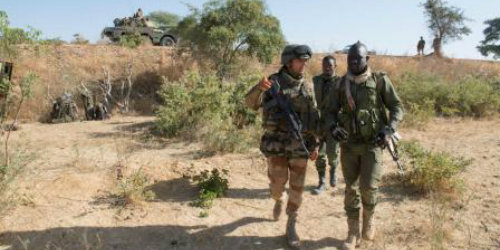Rebuilding civil participation post conflict
Academic findings have led national and international organisations to place greater emphasis on civilian capacity building in post-conflict states.
The role and governance of armed forces in post-conflict states have been markedly improved by research showing the importance of civil participation. Professor Timothy Edmunds, from the School of Sociology, Politics and International Studies (SPAIS), is credited with encouraging governments to embed greater transparency and accountability in the security sector.
Security sector reform (SSR) relates to multiple layers of governmental institutions, including the military, intelligence services and judicial sector, and is pivotal to the development of effective institutions in the wake of conflict and political change.
SSR is widely employed by development and security actors in a range of contemporary conflict, post-conflict and post-authoritarian environments, from the Balkans to Afghanistan to Sub-Saharan Africa.
Theory and practice
Professor Edmunds is a global expert in security sector reform and a leading proponent of SSR, highlighting the real-world advantages of applying intellectual rigour to government policy. His research with SPAIS dates back to 2003 and he was one of the first to clearly articulate a distinction between civilian and democratic control of armed forces.
Professor Edmunds has consistently argued that in order for security sector reform to be meaningful, it must take into account the systems that govern civilian society as well as those that apply to the defence and security sectors themselves.
“Equal if not more weight has to be given to civilian bureaucracy and civil society when states are recovering from a state of war or conflict,” said Professor Edmunds. “Organisational and legislative change are of course important but in order for such changes to be effective, they have to be applicable and appropriate to local society.”
Organisational change
Further evidence for this was found in studies of post-communist Europe and the Western Balkans. Research between 2002 and 2009 revealed how an overly technocratic approach to SSR causes policies to founder owing to the lack of buy-in from local actors.
These findings have gone on to inform defence reviews across the Western Balkans, including in Serbia, leading to better democratic control of the armed forces, and greater engagement with civil society actors.
The importance of domestic social, political and institutional circumstances was also highlighted by Professor Edmunds’ work on the changing role of the European armed forces, including in the UK. His critique of military transformation argued that any review of defence policy must be mindful of social context, otherwise it risks being so far removed from economic, institutional and political factors as to be redundant.
Agenda setting
Professor Edmunds’ work has encouraged national and international organisations to place greater emphasis on civilian capacity building in their SSR programmes. This can be seen in the approaches adopted by the UK Department for International Development (DfID), the Ministry of Defence (MoD), NATO, the UN and the EU.
“Most international SSR initiatives now recognise that in order to succeed, they must secure local ownership and tailor reform to the local context,” said Professor Edmunds, who has since written advisory reports for the British Army, Swedish Ministry of Foreign Affairs, the Geneva Centre for the Democratic Control of Armed Forces, the Contact Group on Piracy of the Coast of Somalia and NATO. His work has also fed into new guidance and training courses aimed at policy makers and practitioners, and forms the basis for the EU’s forthcoming Naval Capacity Building Strategy.
British defence policy
In the UK, Professor Edmunds’ analysis prompted the Houses of Parliament to review the structural tensions within British defence and civil-military relations. His 2007 publication, ‘Out of Step: The Case for Change in the British Armed Forces’ (Dorman and Dunn 2008), has been called the single most important think tank publication on defence since the end of the Cold War.
One of the book’s criticisms was the fundamental disconnect between the resources available to the military compared with policy commitments made by the UK government in terms of its defence capabilities. The research was a key influence on the introduction of a statutory Armed Forces Covenant in 2011.

